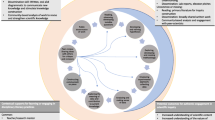Abstract
This manuscript is written in response to Lydia Burke and Jesse Bazzul’s article Locating a space of criticality as new scholars in science education. As doctoral students finding our place in the culture of science education, we respond by discussing our journeys towards the development of a scholarly identity, with particular focus on whether or how we see ourselves as critical scholars. Since each of us authoring this paper has a different perspective, a metalogue format is utilized to ensure all of our voices and journeys are represented. We use the Burke and Bazzul article as a platform for conversations about challenges faced for emerging scholars in the field of science education and explore how we see our role in responding to these challenges. Specifically, we discuss the barriers to publication, dissemination of research to practitioners, and how to approach these problems from a grounding in critical theory. As a result of our conversations, we conclude that there is a need to reshape the field of science education to invite more unorthodox research perspectives, methodologies, and publication formats. To do so, the issues we explore require a continued conversation between emerging scholars, practicing researchers, and practicing educators.
Similar content being viewed by others
References
Aikenhead, G. S. (1996). Science education: Border crossing into the subculture of science. Studies in Science Education, 27(1), 1–52.
Apple, M. W. (2011). Paulo Freire, critical pedagogy and the tasks of the critical scholar/activist. Revista e-Curriculum, 7(3), 1–21.
Bateson, G. (1972). Steps to an ecology of mind: Collected essays in anthropology, psychiatry, evolution, and epistemology. San Francisco: Chandler Pub. Co.
Bonilla-Silva, E. (2006). Racism without racists: Color-blind racism and the persistence of racial inequality in the United States. Lanham, MD: Rowman & Littlefield Publishers.
Brookfield, S. D. (2014). Foundations of critical theory. Advances in Developing Human Resources, 16(4), 417–428. doi:10.1177/1523422314543819.
Cochran-Smith, M. (2000). Blind vision: Unlearning racism in teacher education. Harvard Educational Review, 70(2), 157–190.
Collin, F., & Pedersen, D. B. (2015). The Frankfurt school, science and technology studies, and the humanities. Social Epistemology, 29(1), 44–72. doi:10.1080/02691728.2013.782588.
Deleuze, G., & Guattari, F. (1988). A thousand plateaus: Capitalism and schizophrenia. London: Bloomsbury Publishing.
Derrida, J. (1995). The gift of death: Religion and postmodernism. Chicago, IL: University of Chicago Press.
Derrida, J. (2001). I have a taste for the secret. In G. Donis & D. Webb (Eds.), A taste for the secret (pp. 1–92). Cambridge: Polity Press.
Foss, S., & Foss, K. (2013). A tale of two travelers: The divergent journeys of critical scholars and rhetorical theorists. Western Journal of Communication, 77(5), 529.
Freire, P. (1970). Pedagogy of the oppressed. New York: Seabury Press.
Freire, P. (1978). Pedagogy in process: The letters to Guinea-Bissau. New York: Seabury Press.
Harper, S., & Nichols, A. (2008). Are they not all the same?: Racial heterogeneity among black male undergraduates. Journal of College Student Development, 49(3), 199–214.
Koro-Ljungberg, M. (2015). Methodological responsibility outside duty: Responsibility matters. In Reconceptualizing qualitative research: Methodologies without methodology, (pp. 115–134). Thousand Oaks: SAGE Publications.
Kuhn, T. S. (1996). The structure of scientific revolutions. Chicago, IL: University of Chicago Press.
Lemke, J. (2011). The secret identity of science education: Masculine and politically conservative? Cultural Studies of Science Education, 6(2), 287–292. doi:10.1007/s11422-011-9326-6.
Liddell, D. L., Wilson, M. E., Pasquesi, K., Hirschy, A. S., & Boyle, K. M. (2014). Development of professional identity through socialization in graduate school. Journal of Student Affairs Research and Practice, 51(1), 69–84. doi:10.1515/jsarp-2014-0006.
Martel, A. (1995). Margins of exclusion, margins of transformation the place of women. Inside-Out: Contemporary Critical Perspectives in Education, 152–166.
Paul, J. L. (2005). Introduction to the philosophies of research and criticism in education and the social sciences. Upper Saddle River, NJ: Pearson.
Roth, W., McRobbie, C. J., & Lucas, K. B. (1998). Four dialogues and metalogues about the nature of science. Research in Science Education, 28(1), 107–118. doi:10.1007/BF02461645.
Sawyer, D, I. I. I., & Palmer, R. (2014). A different kind of black, but the same issues: Black males and counter stories at a predominantly white institution. Journal of Progressive Policy and Practice, 2(3), 255–272.
Sidanius, J., & Pratto, F. (1999). Social dominance: An intergroup theory of social hierarchy and oppression. Cambridge: Cambridge University Press.
Solorzano, D., & Yosso, T. (2002). Critical race methodology: Counter-storytelling as an analytical framework for education research. Qualitative Inquiry, 8(1), 23–44.
Staller, K. (2007). Metalogue as methodology. Qualitative Social Work, 6(2), 137–157. doi:10.1177/1473325007077236.
Tobin, K., & Roth, W. (2002). The contradictions in science education peer review and possibilities for change. Research in Science Education, 32(2), 269–280. doi:10.1023/A:1016038414389.
Author information
Authors and Affiliations
Corresponding author
Additional information
Lead editor: C. Quigley.
This manuscript responds to issues raised in Lydia Burke and Jesse Bazzul’s paper Locating a space of criticality as new scholars in science education. doi:10.1007/s11422-016-9735-7.
Rights and permissions
About this article
Cite this article
Cian, H., Dsouza, N., Lyons, R. et al. What does it means to be a critical scholar? A metalogue between science education doctoral students. Cult Stud of Sci Educ 12, 453–467 (2017). https://doi.org/10.1007/s11422-016-9733-9
Received:
Accepted:
Published:
Issue Date:
DOI: https://doi.org/10.1007/s11422-016-9733-9




